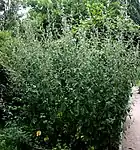| Althaea cannabina | |
|---|---|
 | |
| Scientific classification | |
| Kingdom: | Plantae |
| Clade: | Tracheophytes |
| Clade: | Angiosperms |
| Clade: | Eudicots |
| Clade: | Rosids |
| Order: | Malvales |
| Family: | Malvaceae |
| Genus: | Althaea |
| Species: | A. cannabina |
| Binomial name | |
| Althaea cannabina | |
| Synonyms | |

Althaea cannabina, commonly called palm-leaf marshmallow or hemp-leaved hollyhock, is a perennial herb belonging to the genus Althaea of the family Malvaceae. The leaves resemble those of hemp (Cannabis sativa), hence the specific epithet cannabina ("hemp-like").[1]
Description
Althaea cannabina reaches on average 40–200 centimetres (16–79 in) of height. The stem is erect, cylindrical, pubescent and very branched. Lower leaves are petiolate, hairy and almost completely subdivided in three-five segments, linear or linear-lanceolate, toothed or lobed, up to 2 centimetres (0.79 in) wide and 8 centimetres (3.1 in) long. The upper leaves are simply lobed and toothed. The flowers are solitary or in clusters and grow in the axils of the leaves, on long pedicels up to 10 centimetres (3.9 in) or on long peduncles up to 20 centimetres (7.9 in). They are usually pink or reddish-purple and heart-shaped, 8–10 millimetres (0.31–0.39 in) wide and 13–15 millimetres (0.51–0.59 in) long, with purple-red stamens. The flowering period extends from July through September.
Gallery
 Plant of Althaea cannabina, Castelltallat |
 Close-up on a flower of Althaea cannabina |
 Flower of Althaea cannabina |
 Flower of Althaea cannabina |
 Althaea cannabina leaves and stem detail |
 Whole plant of Althaea cannabina |
Distribution
Althaea cannabina grows wild in central and southern Europe and in the Mediterranean Basin, from Portugal, north Africa and east to Turkey - except Balearic Islands, Corsica, Crete and Chipre - up to central Asia.[2]
Habitat
These plants grow at an altitude of 0–800 metres (0–2,625 ft) above sea level. They prefer coastal thickets, forest edges, meadows, weedy places, roads, wasteland, pastures and parks, especially with rocky and calcareous soils.
References
- ↑ Dictionary of Botanical Epithets
- ↑ O. Bolòs i J.Vigo Flora dels Països Catalans Barcelona 1990
External links